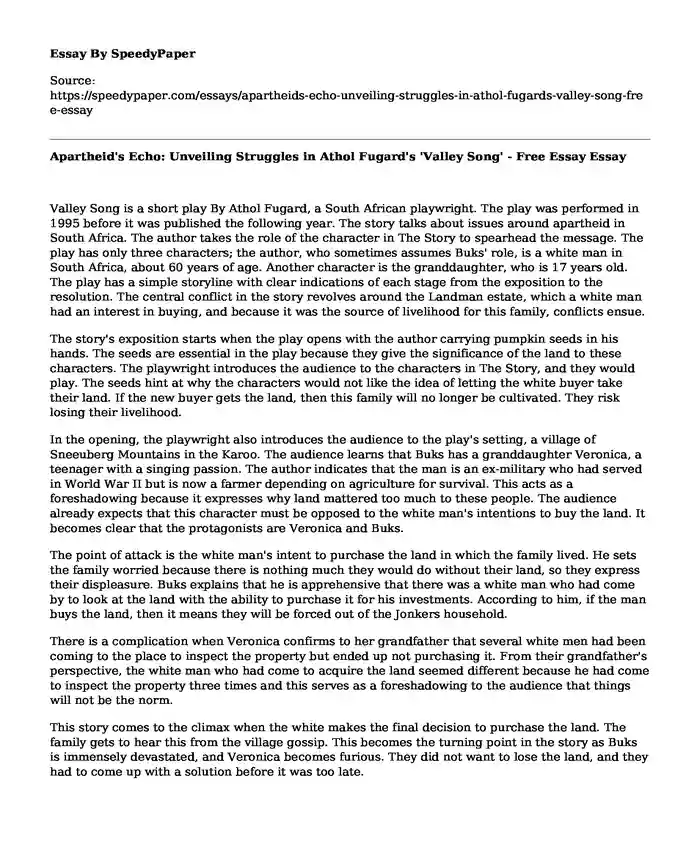
| Type of paper: | Essay |
| Categories: | Theatre Art Character analysis |
| Pages: | 3 |
| Wordcount: | 725 words |
Valley Song is a short play By Athol Fugard, a South African playwright. The play was performed in 1995 before it was published the following year. The story talks about issues around apartheid in South Africa. The author takes the role of the character in The Story to spearhead the message. The play has only three characters; the author, who sometimes assumes Buks' role, is a white man in South Africa, about 60 years of age. Another character is the granddaughter, who is 17 years old. The play has a simple storyline with clear indications of each stage from the exposition to the resolution. The central conflict in the story revolves around the Landman estate, which a white man had an interest in buying, and because it was the source of livelihood for this family, conflicts ensue.
The story's exposition starts when the play opens with the author carrying pumpkin seeds in his hands. The seeds are essential in the play because they give the significance of the land to these characters. The playwright introduces the audience to the characters in The Story, and they would play. The seeds hint at why the characters would not like the idea of letting the white buyer take their land. If the new buyer gets the land, then this family will no longer be cultivated. They risk losing their livelihood.
In the opening, the playwright also introduces the audience to the play's setting, a village of Sneeuberg Mountains in the Karoo. The audience learns that Buks has a granddaughter Veronica, a teenager with a singing passion. The author indicates that the man is an ex-military who had served in World War II but is now a farmer depending on agriculture for survival. This acts as a foreshadowing because it expresses why land mattered too much to these people. The audience already expects that this character must be opposed to the white man's intentions to buy the land. It becomes clear that the protagonists are Veronica and Buks.
The point of attack is the white man's intent to purchase the land in which the family lived. He sets the family worried because there is nothing much they would do without their land, so they express their displeasure. Buks explains that he is apprehensive that there was a white man who had come by to look at the land with the ability to purchase it for his investments. According to him, if the man buys the land, then it means they will be forced out of the Jonkers household.
There is a complication when Veronica confirms to her grandfather that several white men had been coming to the place to inspect the property but ended up not purchasing it. From their grandfather's perspective, the white man who had come to acquire the land seemed different because he had come to inspect the property three times and this serves as a foreshadowing to the audience that things will not be the norm.
This story comes to the climax when the white makes the final decision to purchase the land. The family gets to hear this from the village gossip. This becomes the turning point in the story as Buks is immensely devastated, and Veronica becomes furious. They did not want to lose the land, and they had to come up with a solution before it was too late.
The emotions intensify as Veronica asks herself why this has to happen to their country and why the government could give freedom to its people. It becomes a moment of reflection as the characters ponder what to do since the government seems not to be doing enough to save them. "Every time they stick their nose in your business, you got to pay something" (Valley Song, p. 27). Veronica refers to the white people who always put the natives in trouble. At this moment, Buks breaks even and decides to confront the white man concerning the issue.
The falling action starts as Buks assumes the author's role, and through authorial intrusion, gives a lengthy speech. As the play comes to a resolution, Buks releases Veronica to go to the city to follow her singing passion, and the white man allows him to cultivate in the land as he has always done season after season.
Work Cited
Fugard, Athol. Valley song. Samuel French, Inc., 1997.
Cite this page
Apartheid's Echo: Unveiling Struggles in Athol Fugard's 'Valley Song' - Free Essay. (2023, Dec 07). Retrieved from https://speedypaper.com/essays/apartheids-echo-unveiling-struggles-in-athol-fugards-valley-song-free-essay
Request Removal
If you are the original author of this essay and no longer wish to have it published on the SpeedyPaper website, please click below to request its removal:
- Free Paper Sample: Expansion of my Colleague's Explanation of Journal Article A
- Literary Analysis Essay on Death of a Hired Man and the Lightning Rod Man
- Paper Example. The Pasture
- Essay Sample on Infant Mortality Between Africa and USA
- Paper Example on Dynamics of Work-Family Balance and Inequalities in Healthcare Systems
- Paper on Navigating Faith: Langston Hughes' Spiritual Odyssey in 'Salvation' and 'Goodbye Christ'
- Free Essay Sample - The New Orleans-Chicago Jazz Connection
Popular categories




